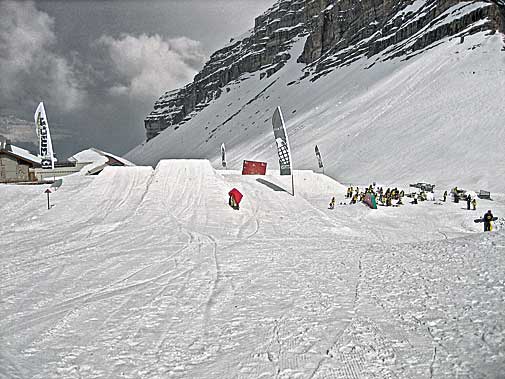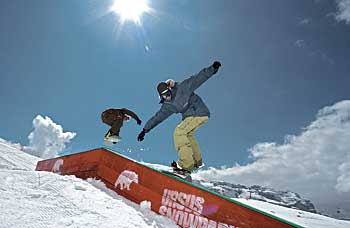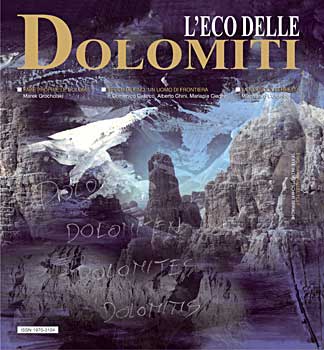ELITE SNOW
Sonia Sbolzani

When the downturn in "skiing holidays" is talked about, it’s not only the vagaries of snow that get the blame. In fact, the origins of the phenomenon are structural, and they involve a number of interrelated causes of an environmental, economic, and social nature.
For example, it has been predicted that in the coming seasons there will be increasingly less snow, also because of global climate change which will raise the average temperature nearly two degrees in just fifteen years (in 2030 the number of days with snow in our Alps will be reduced by 25 %, and global warming will only have little effect above 2,000 metres).
 Therefore, suitable investment should already be made to limit the damage: from less sun-exposed slopes to systems for transporting people to higher altitudes, the production of more artificial snow and more careful management of natural snow. Therefore, suitable investment should already be made to limit the damage: from less sun-exposed slopes to systems for transporting people to higher altitudes, the production of more artificial snow and more careful management of natural snow.
The rising cost of skiing holidays should also be taken into consideration, which in addition to equipment and ski-lift passes includes hotels and restaurants, so that skiing holidays (or what’s left of them) appear less and less competitive compared to other kinds of holidays (especially abroad).
Moreover, a further expansion of winter sports activities seems unlikely, since the number of European skiers is settling down and is extremely difficult to attract new visitors from far away countries (also because these holidays are for short periods of time). In recent years there has been talk of Eastern Europe as an area with many potential new skiers, but it was then discovered that even if there could be a large number of these kinds of skiers, they prefer focusing on low-cost resorts.
The issue of demography should also not to be underestimated. Our classic skiers are getting older, and even if they continue to take mountain holidays, they will expect better quality services: comfortable hotels, genuine food, well-being centres, spas, casinos, nice shops, a clean environment, and opportunities to go for walks in the snow. On the other hand, young people are proving to be less and less interested in traditional sports and prefer new ones like snowboarding or carving. At the same time, they want more entertainment and social and cultural attractions. Therefore, some people have gone as far to say that our alpine resorts must be transformed into snow-parks (with entrance tickets).
Apart from the problems in winter because of the lack of snow, the loss of appeal of mountain holidays is also worrying in the summer, when competition from the seaside resorts (which has a strong attraction because of the so-called "three Ss": sun, sea, and sex) seems unbeatable.
Therefore the crucial question of image has an impact: firstly, it should be understood why Alpine tourism (particularly in respect of young people) is no longer as attractive as it once was, and why it struggles to gain the attention of the mass media, and therefore to get its message across to people. Indeed, it seems that mountains are only newsworthy for sporadic accidents, while nothing of the epic image of mountaineering seems to be left after the Messner era, who let us not forget was in any case a magician in terms of communication! Thus, the effective use of marketing tools could be a solution, in other words all those initiatives (events, advertising campaigns, promotions, etc) that draw the attention of potential tourists (it really would be terrible if mountain tourism, which still has its fans, ended up "like melodrama and music, where only classical music counts, while contemporary music is seen as music for fanatics” as the journalist and alpine historian Peter Crivellaro stated).
 From this perspective, ça va sans dire, many small ski resorts have to radically change strategy to survive, closing their modest facilities and focusing instead on consolidating their real strong points: the landscape, the natural environment, local culture, and the hospitality facilities. From this perspective, ça va sans dire, many small ski resorts have to radically change strategy to survive, closing their modest facilities and focusing instead on consolidating their real strong points: the landscape, the natural environment, local culture, and the hospitality facilities.
The mountain towns that can be competitive are those which are already responsible and aware, at all levels, of the need to equip and organize themselves better to offer a higher quality and increasing variety of services (at a lower cost made possible by achieving economies of scale), more efficient transport, and more all-inclusive packages, to enhance their image and promote it through new channels, starting from the Internet.
Many Italian alpine resorts are already going in the right direction and proof of this is that they are the least affected by the recession, and able to attract “big spenders”, including foreigners. Since it is predicted that mountain holidays will once again become an elite tourism, focusing on higher level hospitality for a smaller but wealthier public is imperative, particularly for the already prestigious Dolomite resorts.
|
 NUMBER 10
NUMBER 10


 Therefore, suitable investment should already be made to limit the damage: from less sun-exposed slopes to systems for transporting people to higher altitudes, the production of more artificial snow and more careful management of natural snow.
Therefore, suitable investment should already be made to limit the damage: from less sun-exposed slopes to systems for transporting people to higher altitudes, the production of more artificial snow and more careful management of natural snow.  From this perspective, ça va sans dire, many small ski resorts have to radically change strategy to survive, closing their modest facilities and focusing instead on consolidating their real strong points: the landscape, the natural environment, local culture, and the hospitality facilities.
From this perspective, ça va sans dire, many small ski resorts have to radically change strategy to survive, closing their modest facilities and focusing instead on consolidating their real strong points: the landscape, the natural environment, local culture, and the hospitality facilities.